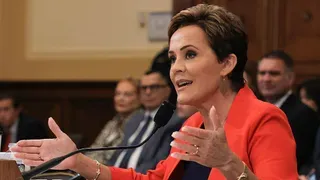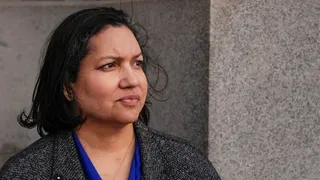November 23, 2011
SC Bishop Being Investigated Amid Episcopal Schism
Jason St. Amand READ TIME: 5 MIN.
The conservative leader of the Episcopal diocese of South Carolina, which has roots stretching to before the American Revolution, is the first bishop facing discipline from the national church over the ongoing schism over the ordination of gay ministers.
While some conservative congregations left the national Episcopal church to join a new Anglican denomination over the issue, the South Carolina diocese has stayed in, while pushing back on theological differences and what it calls the increasing centralization of the church.
Now Bishop Mark Lawrence is facing discipline under new national church rules that took effect last summer - rules that give the national church a greater role in disciplining of priests and bishops. Depending on the outcome, Lawrence could be deposed as a spiritual leader in a church to which he has given his life.
"Personally, I'm not afraid, I'm concerned for the diocese," the 61-year-old bishop told The Associated Press in his first interview since the allegations were announced this fall. "What's at stake here is the worldwide Anglican community: the third largest body in Christendom."
Lawrence said the national Episcopal Church is threatening the unity of the Anglican communion. He said in the diocese "while we are in the vast minority of the Episcopal Church, we hold positions that Anglicans have held for the past 400 to 500 years."
The 2 million-member Episcopal Church is the U.S. branch of the Anglican Communion, which has 77 million members worldwide.
"I don't believe that the founders of the Episcopal Church ever envisioned a day when issues of theology and constitutionality would have arisen as they have arisen right now. I ask myself: 'What are we here in the Diocese of South Carolina called to do?'" he asked. "My gut reaction was this day would come."
The Episcopal Church consecrated its first openly gay bishop in 2003 and, three years later, the Diocese of South Carolina and two others opposing such consecrations voted to reject the authority of the national church's presiding bishop, but stopped short of a full break with the church.
Many conservative Episcopalians believe Scripture forbids same-sex relationships.
Two years ago, four breakaway conservative Episcopal dioceses formed the Anglican Church in North America, a rival national province to the Episcopal Church. Dozens of individual parishes have also joined.
The Diocese of South Carolina did not leave, although it did withdraw from some councils of the national church.
Lawrence has repeatedly said he wants the diocese to remain within the Episcopal Church. But he said the challenge is two main issues: theology and the increasing centralization of the church.
He's being investigated by a national church committee on information from parishioners in South Carolina. He has not been told who filed the complaint, but thinks it's probably the Episcopal Forum of South Carolina, a group working to get the diocese to participate fully with the national church.
"We did not initiate this," said Barbara Mann, president of the forum. Asked if she felt the diocese had abandoned the national church, she said "we don't make decisions like that. What we do support is the process that's going on right now."
"We are working with circumstances that are very, very sensitive about which people have very, very strong convictions," said Bishop Dorsey Henderson, who heads the national church disciplinary board.
He said such investigations are rare and that as of now, no formal charges have been made.
But if the board certifies Lawrence has abandoned the church, the Episcopal Presiding Bishop Katharine Jefferts Schori would suspend him from the ministry while the matter is considered by the national House of Bishops. If the bishops agree by a majority vote, Lawrence could be deposed.
His diocese in eastern South Carolina has 70 congregations with about 29,000 parishioners. Dating from the 1700s, it was one of the original dioceses that joined together to form the Episcopal Church.
A letter from the disciplinary board said it has information the diocese eliminated mention of the national church in the diocesan charter purpose statement and passed a resolution the diocese is a "sovereign diocese."
It also alleged Lawrence did not stop parishes in the diocese from leaving the Episcopal Church. Two have done so, one since Lawrence became bishop in 2008.
That parish was St. Andrews in nearby Mount Pleasant, S.C., a congregation that joined the more conservative Anglican Church in North America. Lawrence said he urged the parish to stay. He said the reason he is now being accused of letting them leave is because he didn't want to sue them.
"We are talking about people who had been faithful members of the Diocese of South Carolina," he said. "Their struggle wasn't with the diocese. They had just come to a place where they would be losing many of their members. I can't condemn them but I wish they had stayed."
While Lawrence sees his diocese's situation as one more step in a longer, continuing struggle within the church, one scholar thinks the schism has played out.
"This is not the main earthquake. What we are seeing now are the aftershocks" from the church's policy of gay ordination, said Frank Kilpatrick, a professor of religion at Trinity College in Hartford, Conn., and author of "The Episcopal Church in Crisis: How Sex, the Bible and Authority are Dividing the Faithful."
"I don't know that there are any churches in any large numbers who are still waiting to decide whether they are going to leave the Episcopal Church. Those that were going to leave have left," he added. "
Lawrence disagrees.
"I think earthquakes come in geologically vast time. The tectonic plates are still moving. I don't think this is behind us," he said. "I think nobody knows how many conservatives are left in the church. I hear all the time from people all over the country who tell me in e-mails and letters that I and the Diocese of South Carolina give them hope to continue."
As to his future, Lawrence said it's not about him.
"If all the members of the standing committee and the Bishop of South Carolina were in a bus that went over a cliff, the problem of South Carolina with the Episcopal Church and the problem of conservatives with the Episcopal Church would not go away."
David Tait, an associate professor at Rodgers State University in Oklahoma who has written extensively about the church, said Episcopal membership has been declining for decades and doesn't have a whole lot to do with ordaining gays.
"That's not helping but it also has to do with demographics: smaller families and a disastrous failure to retain the loyalty of young people when they grow up," he said, adding the church seems to be mainly focused on social issues "and you don't need to go to church to get that."
Henderson said he didn't know how long the board's review might take.
"I want us to be prayerful and careful and I don't want any of the emotions that any of us may be having to drive this," he said.





